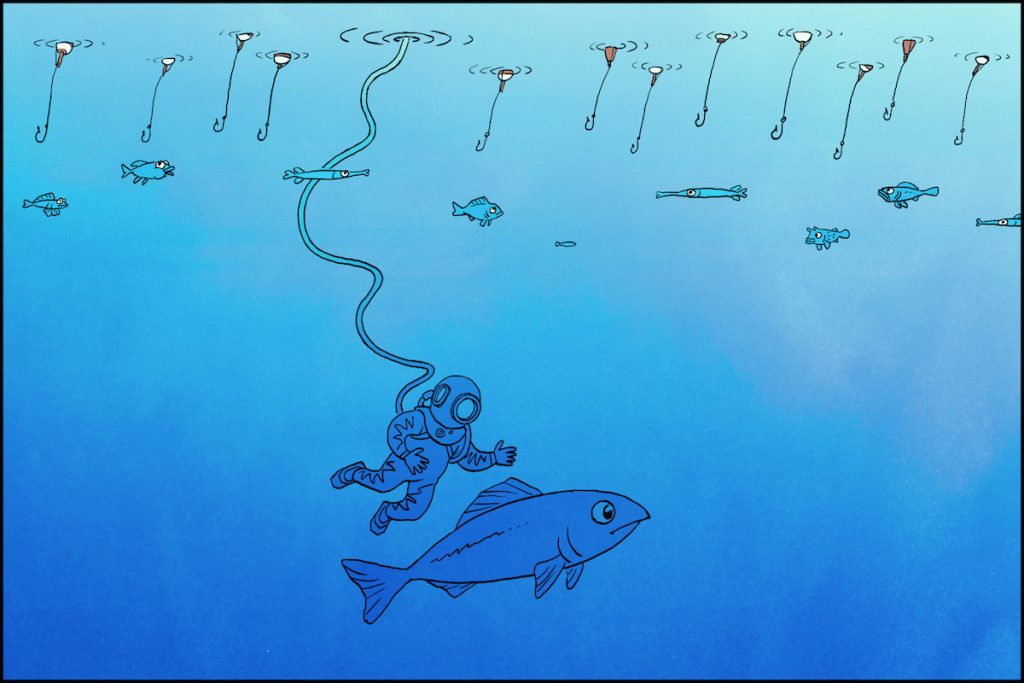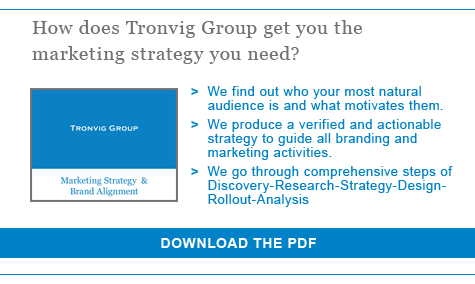Peter Drucker never said it exactly this way, but here is the complete idea: If you satisfy your customers you fail, because in order to succeed you must deeply satisfy the customer for whom your product is most naturally suited.
This idea relies on the fact that you have spent the time and energy to answer Drucker’s 2nd and 3rd questions: “Who is your customer?” and “What does your customer value?” Knowing the answers to these two (and this is no small accomplishment) you can then proceed to satisfying them deeply.
Why is this required? Is satisfying your customer not enough?

Well, no, and here is why. Do you commonly recommend to your friends and family something that met your basic expectations but did not exceed them? Most people would not. Why is this important? Well, it turns out that word-of-mouth still matters a great deal.
The power of word-of-mouth
I’ll use this business as an example. I recently asked a client how they originally found out about us. I had assumed she found us online because she originally called us cold and we do get clients who stumble upon us through this blog. It turned out though that she had asked people she respected for their recommendations. In each case she explained the strategic problem she felt her organization needed to solve and then she asked, “Of all the companies you’ve ever worked with, which one was the absolute best at this?” We were one of the answers she got to that question.
It turns out that word-of-mouth still matters a great deal.
From this she went to our website and found a lot of information about the very thing we had been recommended for. She called us and I said the same things in answer to her questions. Three layers deep she now understands that we care deeply about doing our work this way and most importantly, she also knows from her friend that it was not just talk. So consider this scenario if we had never deeply satisfied that board member … What would have happened?
Nothing.
We would never have come into that board member’s consciousness. She would have recommended someone else or no one.
If you satisfy your customers you fail.
And if our website had talked about our ability to “satisfy any customer” and that we were “great at everything?”
Again probably nothing.
The process would have died right there and we would still be waiting by the phone instead of deep into a multi-year project.
And what if when she got us on the phone we had talked about all our different services for all our different clients and how satisfied they all are with our “great service”?
Probably nothing, because we would be exposing a focus on ourselves and not on solving her problem.
There are so many opportunities to break the chain. But most often it breaks because of a lack of concentration or a lack of understanding of who your customer is and what they truly value.
If I simply satisfy my customers, this whole process fails.
So if I simply satisfy my customers, this whole process fails.
If you only satisfy and do not deeply satisfy, word-of-mouth, the most valuable brand extension mechanism available to you, fails to materialize.
Post-sale brand advocacy
Another way of looking at word-of-mouth is to think of it as post-sale brand advocacy. It turns out that most companies spend the vast majority of their marketing dollars trying to move the process toward the sale and very little to encourage and support post-sale brand advocacy. This kind of advocacy is actually critical to the success of many brands. It is sometimes quantified as a Net Promoter Score, a number based on the question “How likely are you to recommend our product or service?”
How likely indeed if you are simply satisfied? In answering this question “promoters” must give a 9 or 10 on a scale from 0 to 10. Only if you were deeply satisfied by a process, product or people—people who seemed able to read your mind because they understood you so well, and who did everything in their power to make sure that you were deeply satisfied—will inspire you to become such a brand promoter.
To deliver this reliably every time is an aspirational goal for nearly any organization, but the difference between these two versions of customer experience—between satisfied and deeply satisfied—is tremendous.
The difference between these two versions of customer experience—satisfied and deeply satisfied—is tremendous.
So my friend, are your customers satisfied? Yes? Are they deeply satisfied? Is every step of your process designed to ensure deep satisfaction? Or is that still a work in progress? Organizations and businesses that do well in the long run spend a lot of time and effort making sure they are able to deeply satisfy. This extra time may seem hard to justify. Rarely does a customer thank you directly for such effort. But when it comes time to answer the question “Who should I use for this?” or “Which one of these should I buy?” the answer needs to be crystal clear in your customer’s mind.
You and no other. The other path very often leads to ruin.
To learn about the Tronvig Group process, click below to sign up for our mailing list and get access to our library of downloadable guides, including the following:
Illustration for Tronvig Group by Sage Einarsen



Ask for help.
We are kind, thorough and ready when you are. You just need to ask.